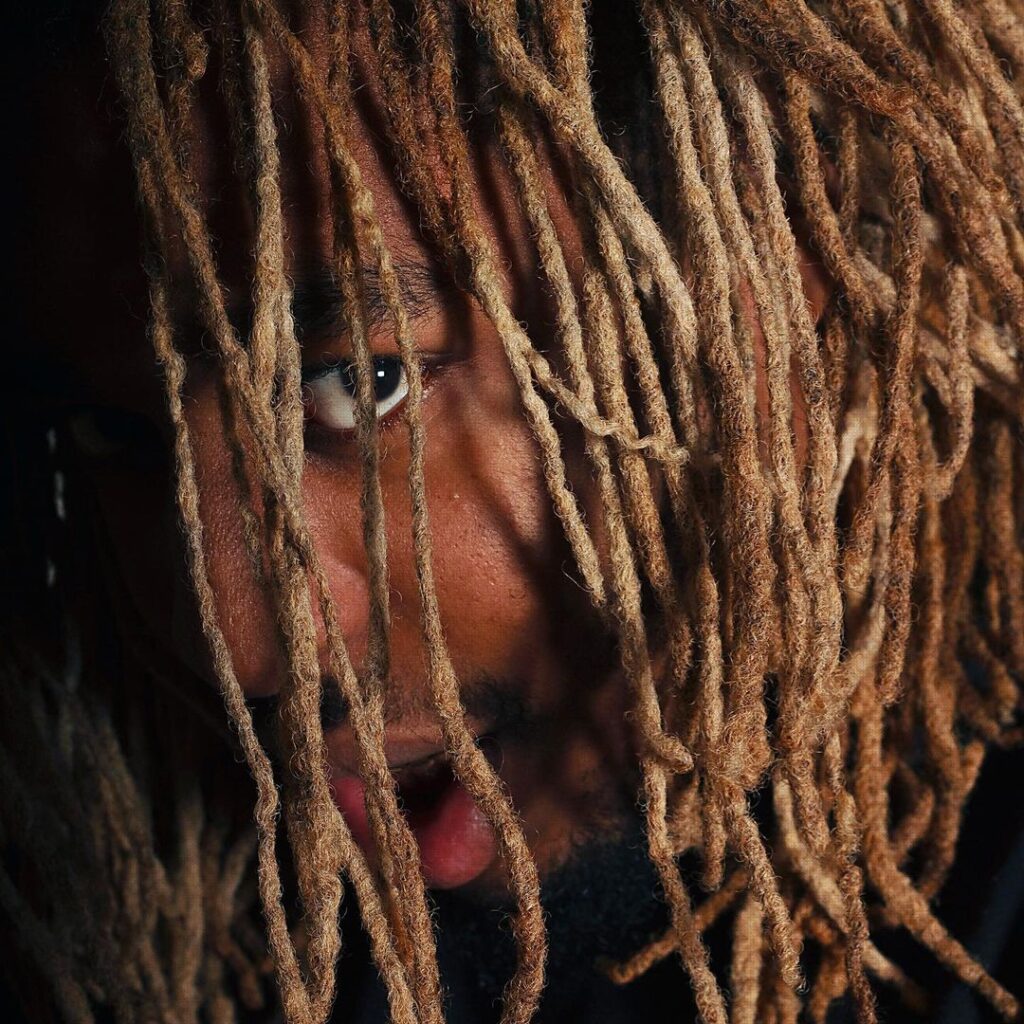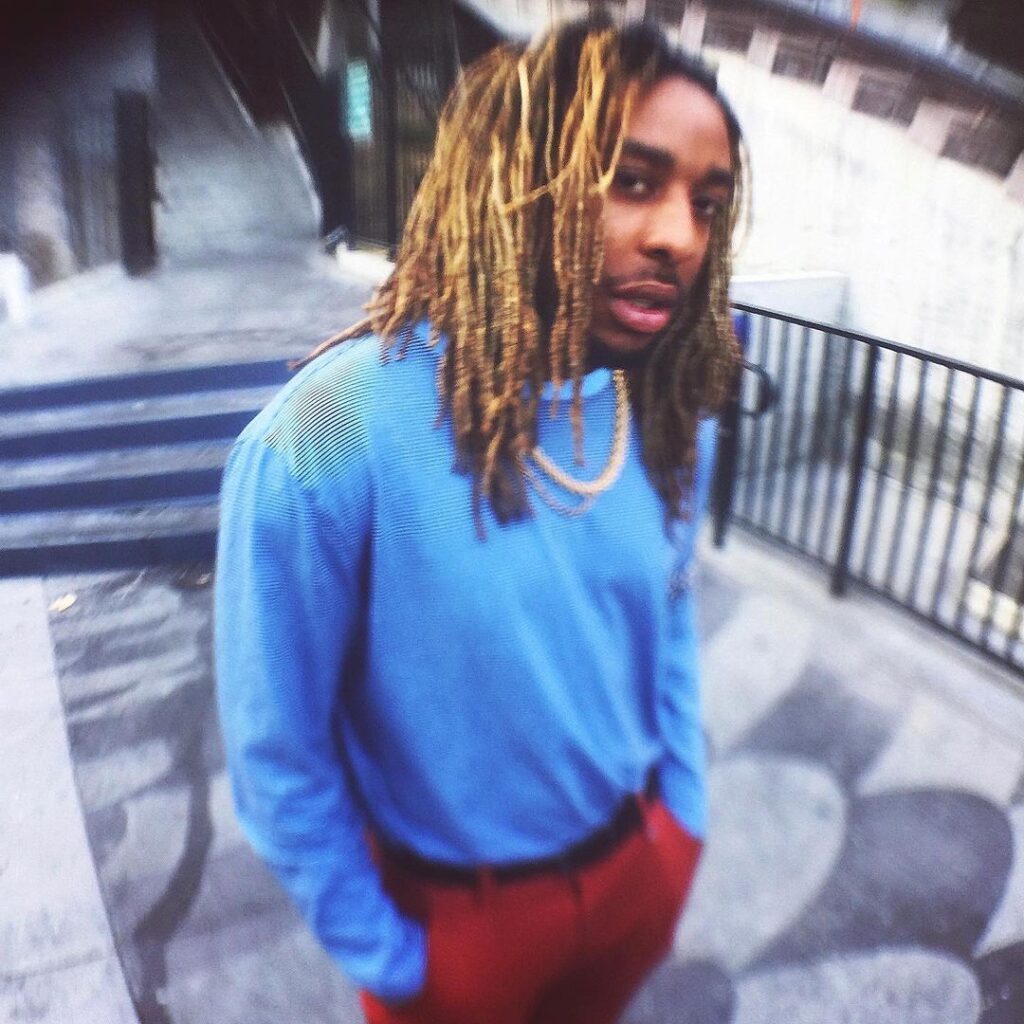Chase Aaron is a neurodivergent recording artist, producer and creative director from the Inland Empire, CA. He harnesses an eclectic array of musical and cultural influences, integrating them into an already eccentric persona that defies the barriers of genre while challenging social stigma. His ever-evolving universe adopts philosophy from impactful artists like Kanye West, Andy Warhol, Kurt Cobain and Prince. Aaron seeks to use his influence to inspire forward-thinking conversations about how to properly navigate neurodiversity and disability in our society. Check out the exclusive interview below:

1. Can you tell us a bit about where you come from and how you got started?
Chase Aaron: I was born in Long Beach but I spent most of my life in the Inland Empire between San Bernardino and Perris, CA. Music is a part of my family’s legacy and they always nurtured my passion for it. My earliest memories are of them helping me set up pots and pans in our kitchen for me to bang around on before eventually getting me my first drum set. As I grew I became more and more enamored with music and my mom, who is an exceptional vocalist, always did what she could to support me whether it was putting me in children’s choir or empowering me to audition for competitions. I remember preparing to audition for American Idol Junior with her. She taught me how to sing my favorite song of all time which is Kiss from a Rose by Seal. Back then I wasn’t sure what I wanted to do with music, but I knew it would become a great part of my life and how I show up in this world.
2. Did you have any formal training or are you self-taught?
Chase Aaron: I’m a hybrid. I have some formal training. I played clarinet and started learning theory in elementary school. I think my first recital was around third grade. To be honest, formal training sucked. It didn’t engage me as a child. The more I did it, the more it pushed me away from doing it and so after about a year or two, I quit. I didn’t consider any formal training again until high school, which is when my paradigm began to shift. By then I had already taught myself the basics of composition and arrangement, but I was searching for all the tools I could find to make me a great artist. I joined choir, took a piano course and enrolled in AP music theory. Everything I learned, I took home and began shaping into my vision.
3. Who were your first and strongest musical influences and why the name ‘Artist’?
Chase Aaron: My first influence was probably Stevie Wonder. His ‘Characters’ album really changed my life early on. As a child, I heard that synth intro on Dark and Lovely and I just wanted to know how I could do that. Have you heard Skeletons? Or Crying Through the Night? I knew I wanted to make people feel how those songs makes me feel. Not to mention, Stevie never wastes a line. Everything is meaningful. You can listen to his music a hundred thousand times and still hear something new in the intention.
4. What do you feel are the key elements in your music that should resonate with listeners, and how would you personally describe your sound?
Chase Aaron: All I’ve ever truly wanted for people to take away from my music was a better understanding of who I am. I like to say that I’m more fluent in the language of music than I am in English, so I use it to convey things that I struggle to convey otherwise. These days there’s a greater desire though. After learning that I suffer from mental illness and sharing that publicly, I realized that I’m reaching a community of people that connect with my experiences. I hope to convey our stories in ways that invoke thought, destroy stigma and ultimately inspire conversations that positively impact our society. As far as describing my sound, I’m trying to stay away from identifying it so that I can continue to create from a space without margin. I like to think I have a pretty eclectic catalog and I think that’s something my fans are excited about. I don’t want anyone to get comfortable with the idea of me having a sonic brand. It would suck if I said “this is what I do” but I put out something else then everyone feels let down because it’s different.

Chase Aaron: When I first got FL Studio I’d recreate the beats of popular songs at the time. I covered a lot of John Legend or Ryan Leslie songs because their voices were the closest thing in the industry to mine at the time. I had an obsession with Ryan Leslie because he was exactly what I thought I wanted to be in music, so naturally my early stuff sounded like basic versions of his. I’m skipping through a lot of time, but I was in a post-hardcore band, started listening to a lot of rock and that influenced me to start incorporating darker, edgier elements into my music. It also inspired me to express my angst honestly and unapologetically. I don’t know how it happened but these days transmuting the energy from my influences is second nature. Maybe its because I don’t think about fitting them into a specific sonic space. I let them guide me and they always take me to new places. I guess that’s why it kinda bums me out that I’m only acknowledged in the R&B category. It’s like walking around with your best outfit on and only getting complimented on your shoes. The whole outfit is a vibe though, ya know?
6. What’s your view on the role and function of music as political, cultural, spiritual, and/or social vehicles – and do you try and affront any of these themes in your work, or are you purely interested in music as an expression of technical artistry, personal narrative and entertainment?
Chase Aaron: I share my innermost thoughts and experiences as a black man battling mental illness, so for me every song is a political, cultural, spiritual and social discussion. I’m setting out to destroy stigma each time. Music is art and art is a mirror for the world. I feel as though great artists give humanity the opportunity to look at itself and decide if we like what we see or not. To me, it is extremely important that we continue to do this on micro and macro levels. This is how we inspire change.
7. Do you feel that your music is giving you back just as much fulfilment as the amount of work you are putting into it, or are you expecting something more, or different in the future?
Chase Aaron: Sometimes I let my desire to make a massive impact get in the way of seeing the impact I’m making now. I’m actively working on that. My vision is expansive so its hard to look at what’s right in front of me. I’m not really answering the question but I mean, I do feel like music has things happening in my world that align with what I want to attract but its tricky. Music brings a lot of unwarranted things as well. To really answer the question I’ll say that I’m looking forward to developing a strong community that shares my values and supports our initiatives. There’s a lot in store and I really need that.
8. Could you describe your creative processes? How do usually start, and go about shaping ideas into a completed song? Do you usually start with a tune, a beat, or a narrative in your head? And do you collaborate with others in this process?
Chase Aaron: Most of the time it starts with me building a melody for the production. Sometimes I’ll get words or a vocal melody before I get to the drums so it varies from there. I mumble a lot. Like, I get these sick melody ideas and they come faster than the words so I have to just hit record and mumble some shit in cadence. Then I go back and plug in words. I love harmonies and ad libs. I might spend a week getting those right. I also mix my own stuff so I’ll spend days to weeks on that. Less time for less dynamic songs. As for collaboration, I’ve done some but it honestly isn’t my favorite. Unless it’s a rare occasion when a person or their art engages me intuitively.
9. What has been the most difficult thing you’ve had to endure in your life or music career so far?
Chase Aaron: I can easily say for both my life and my music career, constantly having to rise above social stigma whether it be as a black man or a bipolar one is the most difficult thing I have to endure.
10. On the contrary, what would you consider a successful, proud or significant point in your life or music career so far?
Chase Aaron: Constantly rising above social stigma whether it be as a black man or a bipolar one. I have so much more to look forward to as far as achievements and significant points go. It’s just that acknowledging this is important to me because I never looked at it as a win, especially now that I’m deciding to be more vocal about these things. It just always felt like surviving. And we’ve created cultures out of that. I’m excited to evolve from that space. I don’t know what life outside of constructs like racism, ableism and other social stigma is like, but for the first time in my life I’ve felt informed and empowered enough to imagine it.
Keep In Touch:
Website | Facebook | Instagram | Twitter |

